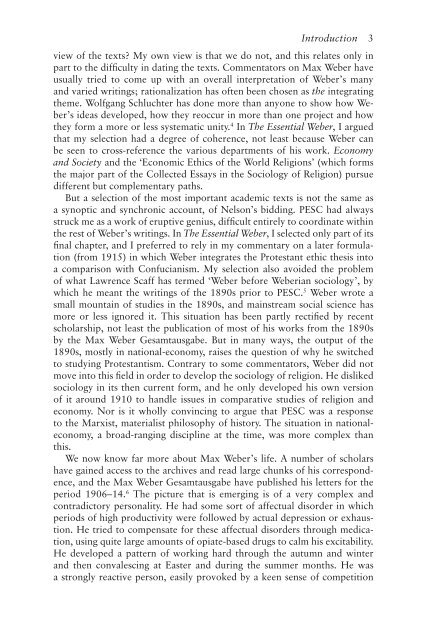Understanding Weber
Understanding Weber
Understanding Weber
Create successful ePaper yourself
Turn your PDF publications into a flip-book with our unique Google optimized e-Paper software.
Introduction 3<br />
view of the texts? My own view is that we do not, and this relates only in<br />
part to the difficulty in dating the texts. Commentators on Max <strong>Weber</strong> have<br />
usually tried to come up with an overall interpretation of <strong>Weber</strong>’s many<br />
and varied writings; rationalization has often been chosen as the integrating<br />
theme. Wolfgang Schluchter has done more than anyone to show how <strong>Weber</strong>’s<br />
ideas developed, how they reoccur in more than one project and how<br />
they form a more or less systematic unity. 4 In The Essential <strong>Weber</strong>, I argued<br />
that my selection had a degree of coherence, not least because <strong>Weber</strong> can<br />
be seen to cross-reference the various departments of his work. Economy<br />
and Society and the ‘Economic Ethics of the World Religions’ (which forms<br />
the major part of the Collected Essays in the Sociology of Religion) pursue<br />
different but complementary paths.<br />
But a selection of the most important academic texts is not the same as<br />
a synoptic and synchronic account, of Nelson’s bidding. PESC had always<br />
struck me as a work of eruptive genius, difficult entirely to coordinate within<br />
the rest of <strong>Weber</strong>’s writings. In The Essential <strong>Weber</strong>, I selected only part of its<br />
final chapter, and I preferred to rely in my commentary on a later formulation<br />
(from 1915) in which <strong>Weber</strong> integrates the Protestant ethic thesis into<br />
a comparison with Confucianism. My selection also avoided the problem<br />
of what Lawrence Scaff has termed ‘<strong>Weber</strong> before <strong>Weber</strong>ian sociology’, by<br />
which he meant the writings of the 1890s prior to PESC. 5 <strong>Weber</strong> wrote a<br />
small mountain of studies in the 1890s, and mainstream social science has<br />
more or less ignored it. This situation has been partly rectified by recent<br />
scholarship, not least the publication of most of his works from the 1890s<br />
by the Max <strong>Weber</strong> Gesamtausgabe. But in many ways, the output of the<br />
1890s, mostly in national-economy, raises the question of why he switched<br />
to studying Protestantism. Contrary to some commentators, <strong>Weber</strong> did not<br />
move into this field in order to develop the sociology of religion. He disliked<br />
sociology in its then current form, and he only developed his own version<br />
of it around 1910 to handle issues in comparative studies of religion and<br />
economy. Nor is it wholly convincing to argue that PESC was a response<br />
to the Marxist, materialist philosophy of history. The situation in nationaleconomy,<br />
a broad-ranging discipline at the time, was more complex than<br />
this.<br />
We now know far more about Max <strong>Weber</strong>’s life. A number of scholars<br />
have gained access to the archives and read large chunks of his correspondence,<br />
and the Max <strong>Weber</strong> Gesamtausgabe have published his letters for the<br />
period 1906–14. 6 The picture that is emerging is of a very complex and<br />
contradictory personality. He had some sort of affectual disorder in which<br />
periods of high productivity were followed by actual depression or exhaustion.<br />
He tried to compensate for these affectual disorders through medication,<br />
using quite large amounts of opiate-based drugs to calm his excitability.<br />
He developed a pattern of working hard through the autumn and winter<br />
and then convalescing at Easter and during the summer months. He was<br />
a strongly reactive person, easily provoked by a keen sense of competition




